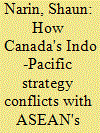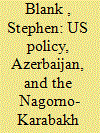| Srl | Item |
| 1 |
ID:
181344


|
|
|
|
|
| Summary/Abstract |
US relations with China and Russia remain deeply problematic. Any hopes for change for the better under a Biden presidency were quickly dashed by the harsh Sino-US exchanges in Alaska in March and by the fallout from “SolarWinds,” Moscow’s brazen hacking attempt.1 No breakthroughs were expected or forthcoming at the US-Russia summit meeting in June, while celebrations of the Communist Party of China’s 100th anniversary in July reconfirmed Beijing’s strident foreign policy course. What’s more, Washington’s principal authoritarian rivals have been cooperating to mutual advantage. Summits between Xi Jinping and Vladimir Putin have been a hallmark of Sino-Russian diplomacy since 2013. It was telling that, right after the US-China encounter in Alaska, Foreign Ministers Wang and Lavrov met in Guilin, China to pointedly condemn Western “interference” in their internal affairs.
|
|
|
|
|
|
|
|
|
|
|
|
|
|
|
|
| 2 |
ID:
192889


|
|
|
|
|
| Summary/Abstract |
Despite giving lip service to the importance of respecting the “centrality” of the Association of Southeast Asian Nations (ASEAN), Canada's Indo-Pacific strategy (CIPS) conflicts with the ASEAN Outlook on the Indo-Pacific (AOIP). Instead, Canada defines its position in the Indo-Pacific through the lens of American priorities and perspectives. For its part, the AOIP expresses an ASEAN consensus position but fails to capture the highly complex and varied views of different ASEAN states toward the US and China. The ASEAN states are status-quo powers navigating a region that is undergoing profound strategic and economic changes. By allying itself so firmly with the US, Canada participates in sowing tension in the Indo-Pacific and may face potential consequences in the longer term. CIPS allows little room for the complex regional relations that the ASEAN states are trying to balance.
|
|
|
|
|
|
|
|
|
|
|
|
|
|
|
|
| 3 |
ID:
138314


|
|
|
|
|
| Summary/Abstract |
Focusing on the abortive Second Afro-Asian Conference of 1965, this article analyzes American efforts to shape the future of Third World internationalism during a critical period of transition in the history of the Third World project, of U.S. relations with the Third World, and of the global Cold War.
|
|
|
|
|
|
|
|
|
|
|
|
|
|
|
|
| 4 |
ID:
139377


|
|
|
|
|
| Summary/Abstract |
Even as the world focuses on Ukraine, Washington has conspicuously ignored resolute action to resolve existing conflicts in the Caucasus, in particular the so-called frozen conflict between Armenia and Azerbaijan over Nagorno-Karabakh. Here, Washington has refused to see that Russia is playing a malignant role in perpetuating the conflict and has refused to act on its own to help prevent either a new Russian domination of the Caucasus or a new war. Indeed, Washington sees Moscow as playing a constructive role. As a result, US relations with Azerbaijan and Baku’s willingness to take heed of American lectures on human rights have all suffered.
|
|
|
|
|
|
|
|
|
|
|
|
|
|
|
|